|
|
|
Sort Order |
|
|
|
Items / Page
|
|
|
|
|
|
|
| Srl | Item |
| 1 |
ID:
170899


|
|
|
|
|
| Summary/Abstract |
India’s approach and policies at climate change negotiations have garnered considerable interest and attention. Over the last three decades, India’s positions have gained more importance as its carbon emissions rise. In this article, I explain India’s ratification of the Framework Convention on Climate Change (FCCC) using the New Interdependence approach, a framework that explains state behavior by analyzing how global rules affects the domestic politics and policymaking around a particular issue. Specifically, I map how the conflicts around which countries should address global warming influenced the domestic politics of climate change in India, particularly the rise of MEA in leading India’s policymaking on climate change, including FCCC negotiations. MEA’s political understanding of climate change, sharpened by two domestic environmental groups – TERI and CSE, decisively shaped India’s approach at FCCC negotiations. Indian negotiators focused on hammering the differences between developed and developing countries helping shape a Framework Convention that differentiated climate responsibilities based on development constraints.
|
|
|
|
|
|
|
|
|
|
|
|
|
|
|
|
| 2 |
ID:
145926
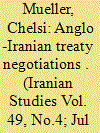

|
|
|
|
|
| Summary/Abstract |
From 1927 to 1932, wide-reaching negotiations took place between Reza Shah's court minister, ‘Abdolhossein Khan Teymurtash, and the British Legation in Tehran, the aim of which was to resolve all outstanding issues and to normalize relations between the two countries on the basis of a general treaty. This article examines these Anglo-Iranian negotiations with a particular focus on the thorniest issues—Iran's territorial claims in the Persian Gulf, particularly its claims to sovereignty over Bahrain, Abu Musa and the two Tunb islands. Though an agreement was never reached, an examination of the content and conduct of these negotiations offers some valuable insights into the unique features of Iranian nationalism and Iranian ambitions in the Persian Gulf during the Reza Shah period.
|
|
|
|
|
|
|
|
|
|
|
|
|
|
|
|
| 3 |
ID:
117856
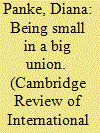

|
|
|
|
|
| Publication |
2012.
|
| Summary/Abstract |
Compared with bigger states, smaller states have fewer votes, less economic power, fewer administrative resources and less staff and experts. This leads to disadvantages in negotiations. Yet smaller states can concentrate their limited resources on issues of great importance and can-under certain conditions-punch above their weight. This is especially effective if small states use their ideational resources in applying different argumentative strategies. Each strategy is only effective under certain scope conditions. The vodka and the pesticides cases illustrate that active small states can punch above their weight if they make arguments that fit the nature of the issue and resonate well with prior beliefs of the addressees of the arguments. A regulatory issue that is technical in nature, such as the pesticides case, requires good scientific arguments. A political issue with prevalent distributive effects, such as the vodka case, calls for normative arguments to persuade neutral actors and the re-framing of the distributional elements into common-good questions to talk actors with opposing preferences into acceptance.
|
|
|
|
|
|
|
|
|
|
|
|
|
|
|
|
| 4 |
ID:
173393
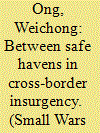

|
|
|
|
|
| Summary/Abstract |
From a local insurgent movement in the Malayan Emergency (1948–60), the Communist Party of Malaya (CPM) transitioned into a cross-border one in the Second Emergency (1968–89) with regional links and implications. Due to the fixation on the Malayan Emergency period, the transition of the CPM insurgency from local to cross border during the Second Emergency period remains underexplored. This article shows how the CPM insurgency transitioned from a local one in Peninsular Malaysia to a protracted cross border conflict with a safe haven in Southern Thailand and how this significant development allowed the CPM to set the conditions of a persistent slow burn conflict in Southern Thailand that was difficult to defeat by security operations alone. This article also addresses how Malaysia, the counterinsurgent state dealt with the unique set of challenges associated with a cross-border insurgency that was subject to the ebb and flow ‘good neighbourly’ relations with Thailand. Finally, this article examines the negotiation process and how the lessons learnt from the failure of the Baling Peace Talks in 1955 were translated into an enduring peace at Haadyai in 1989.
|
|
|
|
|
|
|
|
|
|
|
|
|
|
|
|
| 5 |
ID:
117857


|
|
|
|
|
| Publication |
2012.
|
| Summary/Abstract |
The role of small states has been largely neglected in research on the process and outcome of multilateral negotiations. Even though these states may be active in the agenda-setting processes or display a specific engagement in certain thematic aspects of negotiations, in the end game the outcome of negotiations has been perceived to be dependent on the bargaining between major powers. However, small states also have strategies at their disposal to compensate for these weaknesses. Two principal ones come to mind, prioritization or niche diplomacy, and coalition-building to join forces with like-minded states in order to draw on their resources, expertise and manpower. In the article, we compare two cases of small state coalitions in multilateral negotiations, namely the Like Minded (LM) group in the negotiations that led to the establishment of the International Criminal Court (ICC), and the Alliance of Small Island States (AOSIS) in United Nations climate negotiations. While the two coalitions resort to similar strategies, they have not been comparably successful. We will show that the ability to translate discursive power into measurable effects on outcomes ultimately depends on the institutional setting of the negotiations and the nature of the issue that coalitions are tackling.
|
|
|
|
|
|
|
|
|
|
|
|
|
|
|
|
| 6 |
ID:
067632
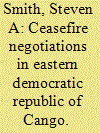

|
|
|
| 7 |
ID:
102433
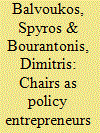

|
|
|
|
|
| Publication |
2011.
|
| Summary/Abstract |
Chairs have a significant potential effect on the bargaining structure and conduct of multilateral negotiations, addressing collective action problems that arise in decentralised bargaining. We examine the role of the Chair as a policy entrepreneur in multilateral negotiations, identifying the parameters that increase the Chair's entrepreneurship potential and condition the outcome of the Chair's entrepreneurial activities. We cluster the identified parameters in three groups of organisational attributes, comprising the Chair's mandate, available resources and (formal) constraints, in particular decision-making rules. We use this typology to analyse four important case studies within the UN setting.
|
|
|
|
|
|
|
|
|
|
|
|
|
|
|
|
| 8 |
ID:
083399


|
|
|
| 9 |
ID:
086422
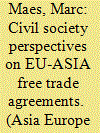

|
|
|
|
|
| Publication |
2009.
|
| Summary/Abstract |
This paper focuses on the positions taken by civil society organisations that actively campaign on trade policies. Trade campaigners oppose the neo-liberal approach to trade and development and advocate a much more gradual and prudent approach to trade liberalisation. They stress that trade liberalisation will only lead to sustainable development if it respects environmental and social concerns, including the gender dimension of trade; if trade liberalisation is properly owned, prepared and sequenced; adapted to the institutional and economic needs and capacities of the countries and people involved, and accompanied by all necessary flanking measures. Trade campaigners stress the need to maintain policy space and the necessary governance instruments to react to changing circumstances and address social and environmental concerns. They denounce the lack of information, consultation and participation provided by governments in trade policy formulation and negotiations and they campaign to raise awareness and create more room for debate and participation.
This article builds on a paper presented on 19-20 June 2008 at an UNU-CRIS Work Shop in Bruges on "Deep Integration and North-South Free Trade Agreements. EU Strategy for a Global Economy".
|
|
|
|
|
|
|
|
|
|
|
|
|
|
|
|
| 10 |
ID:
097771


|
|
|
|
|
| Publication |
2010.
|
| Summary/Abstract |
Negotiated civil war terminations differ from their interstate war counterparts in that one side must disarm and cease to exist as a fighting entity. While termination through military victory provides a relatively more enduring peace, many civil wars end with peace agreements signed after negotiations. However, research has shown that the implementation of civil war peace agreements is difficult and prone to collapse. Often these failures are followed by recurrence of the conflict. In some cases, the agreements break down before key provisions are implemented. This article adds to this topic by focusing on the role of state capacity in peace agreement success. We argue that peace agreements and state capacity are necessary but not sufficient conditions for sustainable peace. The article employs a case study approach to explore the importance of state capacity in implementing civil war peace agreements. The role of third-party interventions is also considered. The cases (United Kingdom-Northern Ireland, Indonesia-Aceh, Burundi, Mali, and Somalia) include 14 peace agreements that vary by war type (secessionist or control over government), type of agreement (comprehensive or partial), levels of state capacity (high or low), and peace success (success, partial or failure), and each experienced third-party involvement in the peace process.
|
|
|
|
|
|
|
|
|
|
|
|
|
|
|
|
| 11 |
ID:
142562


|
|
|
|
|
| Summary/Abstract |
Past research has posited that effective leadership is an essential ingredient in reaching international agreements and overcoming the collective action problems associated with responding to climate change. Despite its fundamental importance for leadership relationships, the demand side of the leadership equation has been comparatively neglected in the literature. In this study, we answer several related questions that are vital for understanding the leadership dynamics that impact the United Nations Framework Convention on Climate Change (UNFCCC) negotiations. Are there any leaders in the field of climate change and, if so, who are they? How do followers select climate leaders? What factors are important to them? Using unique survey data collected at four consecutive United Nations (UN) climate summits, Conference of Parties (COP) 14–17, this article investigates which actors are actually recognized as playing a leadership role in the UNFCCC negotiations and probes how followers select leadership candidates in this issue area. The survey findings reveal a fragmented leadership landscape, with no one clear-cut leader, and spotlight that if an actor seeks to be recognized as a leader, it is crucial to be perceived as being devoted to promoting the common good.
|
|
|
|
|
|
|
|
|
|
|
|
|
|
|
|
| 12 |
ID:
059076
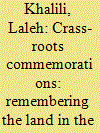

|
|
|
| 13 |
ID:
111476


|
|
|
|
|
| Publication |
2011.
|
| Summary/Abstract |
One of the most effective means for re-establishing trust in negotiations and disputes is by making an apology. However, the function and meaning of an apology (and thus its effectiveness for negotiators) may differ across cultures. We hypothesized that people from an individual-agency culture (such as the United States) understand apologies as analytic mechanisms for assigning blame and re-establishing personal credibility. In contrast, apologies in collective-agency cultures (such as Japan) are understood to be general expressions of remorse rather than a means to assign culpability. A survey of Japanese and Americans found that, compared to Americans, Japanese apologized more often and were more likely to apologize for actions in which they were not involved; on the other hand, Americans were more likely than Japanese to equate apologizing with personal blame. A subsequent experimental study showed that these cultural differences in the function and meaning of apologies have implications for trust repair in disputes: apologies for integrity violations led to greater trust repair for Japanese than for Americans, but apologies for competence violations were somewhat more effective for Americans than Japanese. Implications for theory and practice are discussed.
|
|
|
|
|
|
|
|
|
|
|
|
|
|
|
|
| 14 |
ID:
111480
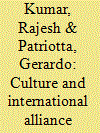

|
|
|
|
|
| Publication |
2011.
|
| Summary/Abstract |
International alliance negotiations are now a pervasive feature of the contemporary global economy. As the alliancing firms cross national boundaries to forge cooperative partnerships they face the inevitable necessity of bridging the cultural divide to ensure successful negotiation. Existing research has focused primarily on the impact of national cultural differences in shaping negotiating strategies and ensuing outcomes. Less attention has been paid to how negotiators from different cultures understand and manage the ambiguity of international alliance negotiations. We employ the theoretical lens of sensemaking to understand how negotiators embedded in different cultures manage simultaneously the task and cultural related ambiguity that they are confronted with. This perspective suggests the critical role that `tertius iungens' (the `third who joins') plays in facilitating the negotiation process. The `tertius iungens' represents a form of intermediation that acts as a catalyst in the negotiation process. We propose three alternative types of intermediation, namely, cognitive, affective, and holistic and provide illustrative examples of these types of intermediation. We conclude by highlighting the theoretical and managerial significance of our framework and by suggesting future directions for research.
|
|
|
|
|
|
|
|
|
|
|
|
|
|
|
|
| 15 |
ID:
084349


|
|
|
|
|
| Publication |
2008.
|
| Summary/Abstract |
Third-party actors who mediate or monitor peace often strive to uphold an image of neutrality. Yet, they commonly face accusations of partiality. The Nordic engagement in the Sri Lankan peace process is an illustration of this puzzle: despite the efforts to uphold an image of being neutral mediators and monitors, they have been seen as favoring one side or the other. This article suggests that part of the explanation for their failure to be seen as neutral lies in the fact that armed conflicts are characterized by certain asymmetries between the main antagonists - in capabilities, status and behavior. These imbalances pose particular challenges to the third party aspiring to act in a neutral manner. We suggest that third parties have two strategies available to deal with imbalances in the relationship between the contenders: 1) they can choose to disregard the asymmetrical relationship and act in an even-handed manner or 2) they can seek to counterbalance the lopsidedness. This article explores the dynamics of these strategies by analyzing the Nordic involvement in Sri Lanka's peace process that began in 2002.
|
|
|
|
|
|
|
|
|
|
|
|
|
|
|
|
| 16 |
ID:
134401
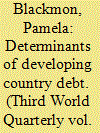

|
|
|
|
|
| Summary/Abstract |
Programmes designed to alleviate developing country debt have been implemented by bilateral, commercial and multilateral creditors and sovereign debt has been restructured under Paris Club negotiations. These strategies have not been very successful at reducing the debt levels of developing countries, in part because they continue to receive export credit insurance facilities through export credit agencies (ecas). The purpose of this paper is to examine the high percentages of developing country debt owed to governmental ecas. Analysis of the external debt of low-income and lower middle-income economies at five year intervals from 1980 to 2010 finds a substantial part of the indebtedness of these economies is held by ecas. Analysis of specific sub-Saharan African countries undergoing debt rescheduling and forgiveness through Paris Club negotiations was done for Ghana and Kenya. These results show that, following debt restructuring, new export credit guarantees and/or loans were forthcoming to these countries from the ecas of the creditor countries that rescheduled their old debt in Paris Club negotiations during 2000–12.
|
|
|
|
|
|
|
|
|
|
|
|
|
|
|
|
| 17 |
ID:
117731
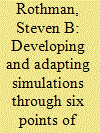

|
|
|
|
|
| Publication |
2012.
|
| Summary/Abstract |
The essay describes a new way to evaluate variation among simulations through six distinct categories. The six points involve the content of the simulation, the integration of the simulation with other aspects of the course, the length of a simulation, the strictness of rules, the interaction among students during the simulation, and assessment techniques. The essay assesses the benefits and costs of the simulation and course design through student feedback and instructor evaluation. In addition, the essay uses these six points of variation as a framework to explain a sample simulation integrated with course objectives, goals, lecture material, two short research essays, and other class activities designed to teach game theory applied to current international problems. The simulation uses current world issues to help students incorporate class content, game theoretic modeling, and strategic interaction into an international negotiation conducted in class.
|
|
|
|
|
|
|
|
|
|
|
|
|
|
|
|
| 18 |
ID:
188326
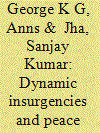

|
|
|
|
|
| Summary/Abstract |
The intended purpose of this paper is to examine the viability of political resolution as a counterinsurgency strategy. We have selected numerous political negotiation processes between insurgents and government of India in general and Mizoram in particular. The political resolution with Mizo National Front is considered as the most successful counterinsurgency operation in India. Placing this as a model, the government of India employed the strategy of negotiation with various other insurgent groups. The degree of success in Mizoram was not replicated in other insurgency theatres. This was analyzed with the help of a comparative study with other insurgent groups in India, particularly within the state of Assam. It is found that the model of Mizo resolution has been influencing the peace process that came later. And also the strategy of negotiation has been evolving into incorporating civil society groups as signatories to the final peace settlement signed between insurgents and government. This analysis of the peace process is also based on the conceptualization developed from various authors.
|
|
|
|
|
|
|
|
|
|
|
|
|
|
|
|
| 19 |
ID:
085344
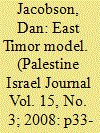

|
|
|
|
|
| Publication |
2008.
|
| Summary/Abstract |
I write this in the aftermath of Sari Nusseibeh's interview with Haaretz correspondent Akiva Eldar1. Dr. Nusseibeh, president of Al-Quds University, esteemed Palestinian intellectual and cosignatory with Israeli Minister Ami Ayalon of the "The People's Choice" peace plan, states in the interview that, while he still favors it, "time is running out on the two-state solution." Indeed, despite declared good intentions, there remains little hope now that the current round of talks between Prime Minister Ehud Olmert and President Mahmoud Abbas (Abu Mazen) will yield tangible results.
|
|
|
|
|
|
|
|
|
|
|
|
|
|
|
|
| 20 |
ID:
135057


|
|
|
|
|
| Summary/Abstract |
After over a decade of languishing in stalemate, the Doha Development Agenda – the first round of trade negotiations launched under the auspices of the World Trade Organization – finally achieved a breakthrough at the Bali ministerial in 2013. Given that the Doha mandate places development – and particularly the concerns of the Least Developed Countries (ldcs) – at the heart of its agenda, our paper focuses on what the Bali outcome means for the world’s poorest countries. As a first step we provide a brief background against which the Bali negotiations took place. In the second section we assess the achievements and limitations of the Bali outcome, focusing on the ldc-specific package and also commenting on other issues that affect the ldcs. In the third section we explain the reasons for some of the achievements at Bali, which include negotiating strategies used by the ldcs themselves. In the fourth and final section we identify a plan of action for the future.
|
|
|
|
|
|
|
|
|
|
|
|
|
|
|
|
|
|
|
|
|